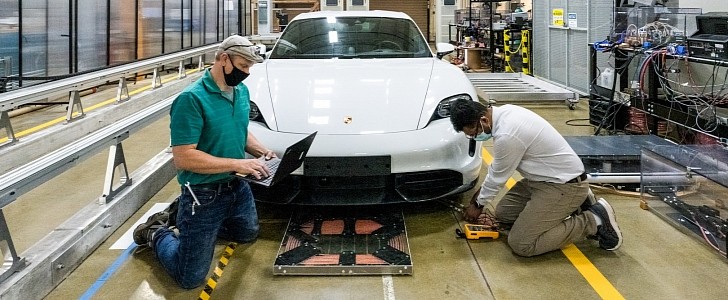The VW Group’s Innovation Hub in Knoxville, Tennessee, is working together with the Oak Ridge National Laboratory (ORNL) in order to research breakthroughs in material science and recycling concepts to support electric mobility and sustainable transportation. The first order of business is to test out a new high-power wireless EV charging concept using a Porsche Taycan.
Thanks to VW’s expertise in electric mobility, researchers have been able to build up from a charging power level of 6.6 kW to 120 kW, with a goal of 300 kW – which would be enough to provide that Taycan with an 80% charge from zero in about 10 minutes. Not bad at all.
During initial trials, a prototype system had shown a high level of efficiency where up to 98% of the energy used (coil-to-coil) made it to the vehicle’s battery. The goal here is to develop these higher-power wireless chargers through breakthrough designs that focus on electromagnetic waves that eliminate interference and increase efficiency.
“We are excited to work with Volkswagen to demonstrate ORNL’s high-powered, ultra-efficient wireless charging technology,” said Xin Sun, Associate Laboratory Director for Energy Science and Technology at ORNL.
“Our unique polyphase electromagnetic coil design and power electronics provide high power transfer levels in a compact system, with the potential to alleviate electric vehicle range anxiety and speed the decarbonization of the U.S. transportation sector.”
By the way, this project is also supported by the DOE Office of Energy Efficiency & Renewable Energy’s Vehicle Technologies Office.
Other projects currently in the pipeline at VW’s Innovation Hub Knoxville focus on advanced functional materials such as composite car body parts, as well as plant-based materials for future interior designs. The team is also experimenting with new recycling concepts for materials previously deemed non-recyclable, like fiber-reinforced composites.
The German carmaker has innovation centers all over the world, such as in Belmont, California; Wolfsburg, Germany; and Beijing, China, along with hubs in Barcelona, Spain; Tel Aviv, Israel; and Tokyo, Japan.
During initial trials, a prototype system had shown a high level of efficiency where up to 98% of the energy used (coil-to-coil) made it to the vehicle’s battery. The goal here is to develop these higher-power wireless chargers through breakthrough designs that focus on electromagnetic waves that eliminate interference and increase efficiency.
“We are excited to work with Volkswagen to demonstrate ORNL’s high-powered, ultra-efficient wireless charging technology,” said Xin Sun, Associate Laboratory Director for Energy Science and Technology at ORNL.
“Our unique polyphase electromagnetic coil design and power electronics provide high power transfer levels in a compact system, with the potential to alleviate electric vehicle range anxiety and speed the decarbonization of the U.S. transportation sector.”
By the way, this project is also supported by the DOE Office of Energy Efficiency & Renewable Energy’s Vehicle Technologies Office.
Other projects currently in the pipeline at VW’s Innovation Hub Knoxville focus on advanced functional materials such as composite car body parts, as well as plant-based materials for future interior designs. The team is also experimenting with new recycling concepts for materials previously deemed non-recyclable, like fiber-reinforced composites.
The German carmaker has innovation centers all over the world, such as in Belmont, California; Wolfsburg, Germany; and Beijing, China, along with hubs in Barcelona, Spain; Tel Aviv, Israel; and Tokyo, Japan.







